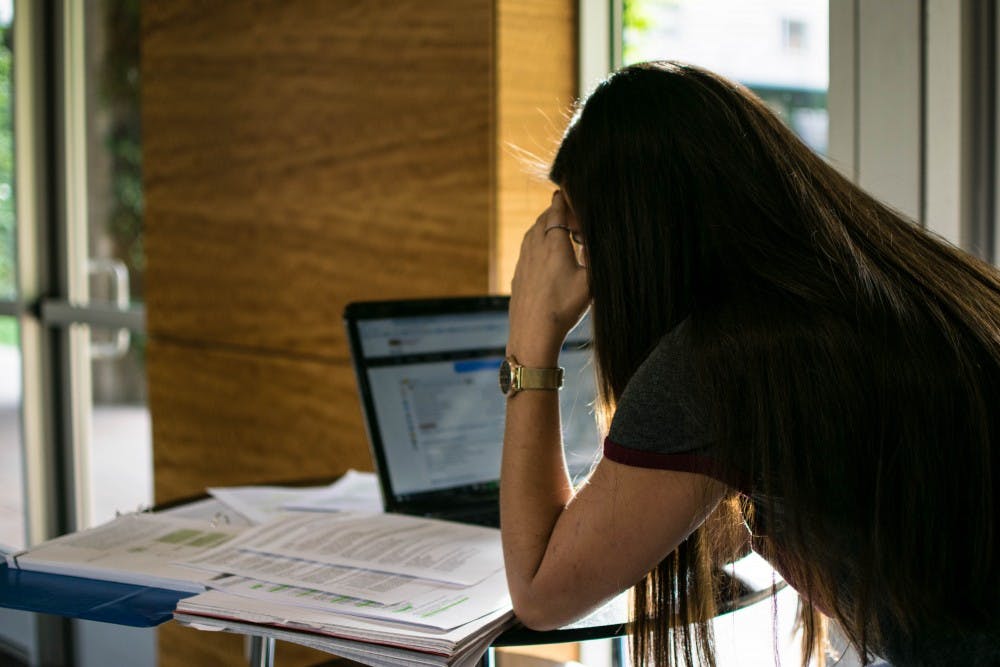ASU alumna Aida Chavez says she isn't afraid to talk about her struggles with mental health. She's battled depression and anxiety during an abusive relationship but has never given up on her fight.
"I started spiraling out of control for a while," Chavez says. "Then I got to a place that I was pretty stable. I’ve tried all kinds of medicine, and sometimes I still have times that I relapse and maybe enter a depressive episode with panic attacks, but it's much easier to manage now."
Now a journalist for The Intercept, Chavez says after going through her experiences with mental health she wants to promote a positive mental health stigma within society.
"I also tweet about my (mental health) stuff and a lot of people have thanked me for being so open," Chavez says. "I think if everyone did the same this stigma wouldn't exist. My friend’s in general are pretty open and help create a safe space for not judging harshly."
Forty-seven percent of Americans believe they have or have had a mental illness, but only 38 percent received treatment, according to a survey conducted by the Anxiety and Depression Association of America. However, in the same study, adults 18 to 34 were the most likely to think positively of seeking professional help and believe suicide can always or often be prevented.
At ASU, 10.7 percent of ASU students said they considered attempting suicide in the past 12 months, according to Live Well @ ASU. However, 90 percent of ASU students said they helped distressed students find the support they needed.
Breaking the negative mental health stigma barrier
ASU Tempe Undergraduate Student Government President, Brittany Benedict shared the organization's goals that are meant to change the rate of suicide statistics on campus and bring positive awareness to the issue.
“One program that USG has helped the Health Services Center put together is a training called Devils 4 Devils,” Benedict says. “This program is a four-tiered training where you have the opportunity to learn about mental health and each tier is a different depth of the training. This is designed to educate the student body on these topics as well as educate student leaders on how to spot signs of distress within their members.”
Benedict discussed her executive’s goals for ASU’s health and wellness as well as USG’s goal to destigmatize society’s view of mental health problems.
“My executive ran on a platform of furthering the Devils 4 Devils mental health training on ASU's campus,” Benedict says. “We believe that the mental health of our students on campus is very important. ASU is committed to helping students with mental illnesses as well as destigmatize mental health to let students know that it is OK to have a mental illness, and we are here to help.”
ASU’s Active Minds Club states on its Facebook page that its goal is to “reduce the stigma that surrounds mental health issues and promote awareness of mental health.” ASU Active Minds social media and outreach assistant Sara Mavis discussed on behalf of the organization the solutions the organization is implementing to prevent increasing suicide rates on campus.
“Active Minds has several events throughout the semester,” Mavis says. “We usually try to have two events a month ranging from tabling at the MU about a mental illness or community walks to support mental health organizations. The purpose of the tabling is to educate the student body at ASU in order to try and end stigmas on campus.”
Accepting professional help
If students want to seek professional help on campus, they can do so through ASU Counseling Services. There's a location on the Tempe, West, Downtown and Polytechnic campuses and walk-ins are welcome from 8 a.m. to 5 p.m.
Walk-ins, crisis services, initial consultations and additional assessment appointments are free. However, group, individual and couples counseling is $15 per session with or without ASU Student Health Insurance.
Chavez expressed she now knows more about medicine to treat her anxiety and depression to help cope with her mental health problems in a positive and healthy manner.
"I wish I would have known more about medicine even though it's not for everyone, but it should be a part of some people's treatment," Chavez says. "If there wasn’t such a stigma attached to medicine, I would’ve gone to a doctor years ago to ask for help way earlier to help stabilize myself. I don’t want to go without (the medicine)."
Chavez continues to describe some of her positive solutions and ways to cope with her anxiety and depression throughout the course of her life.
"In general its really hard to ask for help," Chavez says. "It's not an easy thing to do especially when they need help the most, and they want to ask the least. I want people to ask for help because it's out there, and there will be someone out there who won't judge you harshly. Whether it's therapy or medicine, or a combination of both, people just need to ask for it and be brave for everyone."
Reach the reporter at Ashlee.Thomason@asu.edu or follow @ThomasonAshlee on Twitter.
Like The State Press on Facebook and follow @statepress on Twitter.




